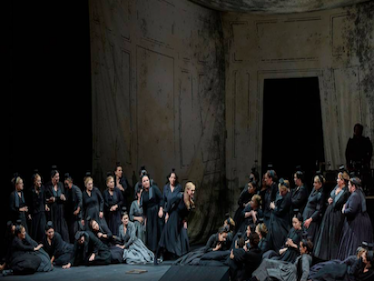Der fliegende Holländer - Schedule, Program & Tickets
Der fliegende Holländer
The Dutchman is a cursed, a driven, an outsider. The character of this homeless man met Richard Wagner in Heinrich Heine, who told the romantic fabric but with his typical irony. Wagner, on the other hand, was not interested in Heine's story, which distanced the Dutchman's fabric. Wagner immersed himself in the story of the mysterious sailor and created his first opera about the man's search for the woman who saved him. Dutchman, the restless wanderer between life and death, meets a woman - Senta - who also seems strange and homeless, longing for a male figure born of her own fantasies: the Dutchman. It is a world of dream images and of the fantastic, the obsessions and the projections - a world that has long since lost touch with reality. This is especially true of the hunter Erik, who appears as perhaps the only true and real lover. But he does not reach the others who dissolve in their dreams anymore. Wagner's opera, written in 1841 and premiered in Dresden in 1843, is after the preceding RIENZI, which stylistically followed the Grand Opéra, a turn to the tradition of the German romantic opera by Weber or Marschner. Despite this orientation towards the Zeitgeist, the work anticipates Wagner's further development as a music dramatist. And for the first time Wagner's life's theme of salvation through love stands in the center.
The director and choreographer Christian Spuck, who was already enthusiastic about his production of Hector Berlioz's FAUSTS VERDAMMNIS at the Deutsche Oper Berlin in 2014, was already working for the second time at the Deutsche Oper Berlin, again in a team with General Music Director Donald Runnicles.
Subject to change.
The director and choreographer Christian Spuck, who was already enthusiastic about his production of Hector Berlioz's FAUSTS VERDAMMNIS at the Deutsche Oper Berlin in 2014, was already working for the second time at the Deutsche Oper Berlin, again in a team with General Music Director Donald Runnicles.
Subject to change.
There are no products matching the selection.






